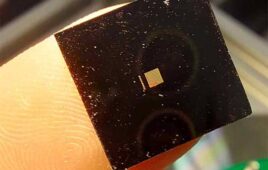 Global Kinetics’ Personal KinetiGraph (PKG), a wearable device for Parkinson’s disease patients, provided more information about symptoms than a routine clinic visit, a recent study found.
Global Kinetics’ Personal KinetiGraph (PKG), a wearable device for Parkinson’s disease patients, provided more information about symptoms than a routine clinic visit, a recent study found.
The device, which monitors, quantifies and reports Parkinson’s movement symptoms, generated new data that was significant enough to change the medical management of one-third of study participants, according to the company. The study was reported in the Journal of Parkinson’s Disease and was conducted at the Parkinson’s Institute and Clinical Center in Mountain View, Calif., from December 2015 through July 2016.
Four movement disorder specialists who received the PKG data completed a survey for four categories of patients: those visiting the clinic for the first time; patients with fluctuations in Parkinson’s symptoms; patients with an unclear Parkinson’s symptom history; and patients considering advanced therapy. For each patient visit, the survey assessed whether the PKG provided additional information beyond what could be gathered through physician examination and patient-reported symptoms. An evaluation of the impact of the additional information on changes to clinical management was assessed.
Of the 112 surveys conducted in the study, 41% indicated that the PKG provided additional information to the physician. Of these surveys, 78% showed that the data resulted in changes to the patient’s treatment plan. The most common new piece of information from the PKG resulting in treatment changes was precise information on when the patient was not adequately treated, referred to as “daily off times” (50%).
Currently, it is difficult to track a patient’s motor symptoms when the patient is at home. Melbourne, Australia-based Global Kinetics’ PKG is the first FDA-cleared technology to provide continuous quantitative data on movement disorder symptoms including tremor, bradykinesia (slow movement) and dyskinesia (abnormal or impaired movement) in a non-clinical setting. Patients wear the device at home for several days to help objectively monitor motor symptoms. The information is then transmitted to their physician for review during their next clinical visit.
“The wearable PKG technology provides objective measurements which allow us to further deliver the highly individualized care that a patient deserves,” said study co-author former institute CEO Carrolee Barlow, M.D., in a prepared statement.
“These results demonstrate the real-world clinical benefits that PKG can provide to patients and clinicians in their continuing effort to optimize Parkinson’s therapy, and manage symptoms effectively,” added Global Kinetics CEO John Schellhorn. “In the absence of standardized objective measures for assessing and managing (Parkinson’s disease), we believe that PKG has the potential to transform the care and outcomes of patients living with the daily challenges of this disease. The results of this study support the use of PKG as an important tool for individualizing therapy to best meet each patient’s unique needs.”




